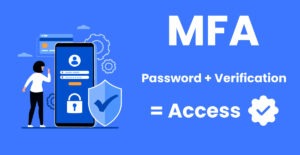
As we gather to celebrate the birth of Christ this Christmas, we’re reminded of the importance of love, joy, and generosity. It’s a time to give, receive, and share in the holiday spirit with friends and family. However, amid the festivities, we must also be mindful of those who may attempt to take advantage of our goodwill. Scammers are more active than ever during the holiday season, preying on unsuspecting people in hopes of quick gain with Christmas scams. To help you avoid holiday scams, let’s look at the most common tricks these fraudsters use and how you can protect yourself.
By understanding how these scams work, you’ll be prepared to protect yourself and your loved ones from falling victim to holiday scammers and keep your Christmas season bright and cyber secure!

1. Avoid Holiday Scam Apps
Many holiday-themed apps are fun, from Christmas countdowns to photo editors that add festive touches to pictures. But not all holiday apps are harmless. Some are laced with malware or contain invasive ads designed to collect your personal data. To avoid holiday scams related to apps, only download those from reputable sources like the Google Play Store or Apple App Store, and check reviews to ensure the app’s legitimacy.
Tips to Identify Safe Holiday Apps:
Examine Permissions Carefully: Avoid apps that ask for access to sensitive data, like your contacts or location, which aren’t necessary for a holiday countdown or photo filter.
Check Reviews and Ratings: Low or no reviews could signal an untrustworthy app.
Look for Reputable Developers: Only download apps from developers you recognize.
2. Watch Out for Free Gift Card Offers
Nothing catches the eye like a “free” gift card, especially during the holidays. Scammers know this and often use the promise of gift cards to trick people into sharing personal information or clicking phishing links. You might see offers in emails, on social media, or through pop-up ads promising high-value gift cards for completing a simple survey or clicking a link. However, most of these are scams.
How to Avoid Christmas Gift Card Scams:
- Be Skeptical of Unrealistic Offers: If it sounds too good to be true, it probably is.
- Avoid Clicking Unverified Links: Scammers often send links to fake websites where they collect your information.
- Only Trust Official Promotions: Verify offers directly from retailer websites, not through third-party sources.


3. Fake Charities Target Generous Donors
During Christmas, many feel inspired to give back, and unfortunately, scammers capitalize on this by creating fake charities. They use names that sound official, display heartwarming images, and even set up donation websites that look legitimate. If you want to donate, be cautious and research the charity to avoid holiday scams.
Tips to Confirm a Legitimate Charity:
Look for Clear Contact Information: Fake charities often have vague or no contact information and may have misspelled words on their website.
Verify with Charity Databases: Websites like Charity Navigator or GuideStar can confirm the legitimacy of an organization.
Avoid High-Pressure Tactics: Real charities will not pressure you to donate immediately.
4. Fake Shipping Notices and Delivery Alerts
With the increase in online shopping, Christmas shipping scams have also increased. Scammers send fake notifications via text or email, posing as reputable shipping carriers. These messages often ask you to confirm details or pay a fee, leading to sites that steal personal information or infect your device with malware. To avoid holiday scams related to shipping, be cautious of any unsolicited delivery messages.
How to Avoid Holiday Delivery Scams:
- Verify Tracking Numbers on Carrier Websites: Genuine carriers have secure sites where you can track your package.
- Do Not Click Links from Unknown Senders: Instead, go to the carrier’s website directly.
- Watch for Payment Requests: Legitimate carriers don’t ask for additional fees in this manner.


5. Suspicious Deals and “Too Good to Be True” Discounts
Scammers know that holiday shoppers love bargains, so they often set up fake sites with amazing “deals” that lure customers into providing credit card information. These sites may look like well-known retailers, but they are traps set up to steal your payment details. When in doubt, remember that if a deal seems too good to be true, it probably is.
How to Identify Fake Shopping Websites:
Read Online Reviews: Avoid new or suspicious websites with no reviews.
Double-Check URLs: Look for slight changes, such as an extra letter or different domain endings (.net instead of .com).
Look for Secure Payment Options: Make sure the site has “https” in the URL and a padlock icon.
6. Social Media “Secret Santa” and Gifting Holiday Scams
The “Secret Santa” gift exchange trend on social media can be fun but can also be an avenue for Christmas scams. Some of these “exchanges” operate as pyramid schemes, asking you to send gifts or money in hopes of receiving multiple gifts in return. This often results in little more than empty promises.
How to Avoid Holiday Scams with Social Media Gifting:
- Stick to Personal Exchanges: Only participate in exchanges organized by close friends or coworkers.
- Be Skeptical of Large or Anonymous Groups: Social media gift exchanges involving strangers can be risky.
- Question Unverified Groups or Pages: If there’s no clear organizer, avoid participating.


7. Phishing Emails Disguised as E-cards
Electronic holiday cards (e-cards) are an easy way to spread holiday cheer, but they can also be used as a phishing tool. Scammers use fake e-cards to entice recipients to click links or download files that install malware. Be cautious, especially if you receive a card from someone you don’t know.
How to Recognize a Fake E-card:
Be Cautious with Attachments: Many real e-cards don’t come with attachments, so be wary of any that do.
Check the Sender’s Email: If the address seems off, it’s safer to delete the message.
Don’t Click Suspicious Links: Real e-cards don’t usually ask you to download additional files.
8. Avoid Holiday Scam Giveaways on Social Media
During the holiday season, you may come across giveaways on social media for items like smartphones, game consoles, or vacations. While some are legitimate, others are scams designed to gather your personal information, get you to follow fake accounts, or even install malware on your device.
How to Spot Fake Giveaways:
- Look for Verification: Only trust giveaways from verified accounts.
- Read Terms and Conditions: Legitimate giveaways will have clear terms and links to an official website.
- Watch for Unusual Requests: Giveaways should not require excessive information, such as your Social Security number.


9. Family and Friend Impersonation Holiday Scams
Another way scammers may strike is by posing as a friend or family member in distress, claiming they need urgent financial help. Often, these messages come from hacked accounts, creating an illusion of authenticity. This can be especially convincing during the holidays, when you’re more likely to help out.
How to Avoid Family Impersonation Scams:
Check for Unusual Language: If the message doesn’t sound like the person, it could be a scam.
Verify Directly: Contact the person by phone or another secure method to confirm their story.
Watch for Urgent or Suspicious Requests: Scammers create urgency to pressure you.
Spread Holiday Cheer Without Fear
While Christmas is a time for celebration, joy, and generosity, we must also remain cautious to avoid holiday scams. By keeping these scam warnings in mind and sharing them with your loved ones, you’ll help protect yourself and others from falling victim to holiday fraudsters.
Let this season be a time of peace and joy, not a time of worry over scams. Stay informed, trust your instincts, and focus on what makes the season truly special—celebrating with family, giving to those in need, and cherishing the birth of Christ. By being vigilant, you can keep your holidays safe and scam-free.


